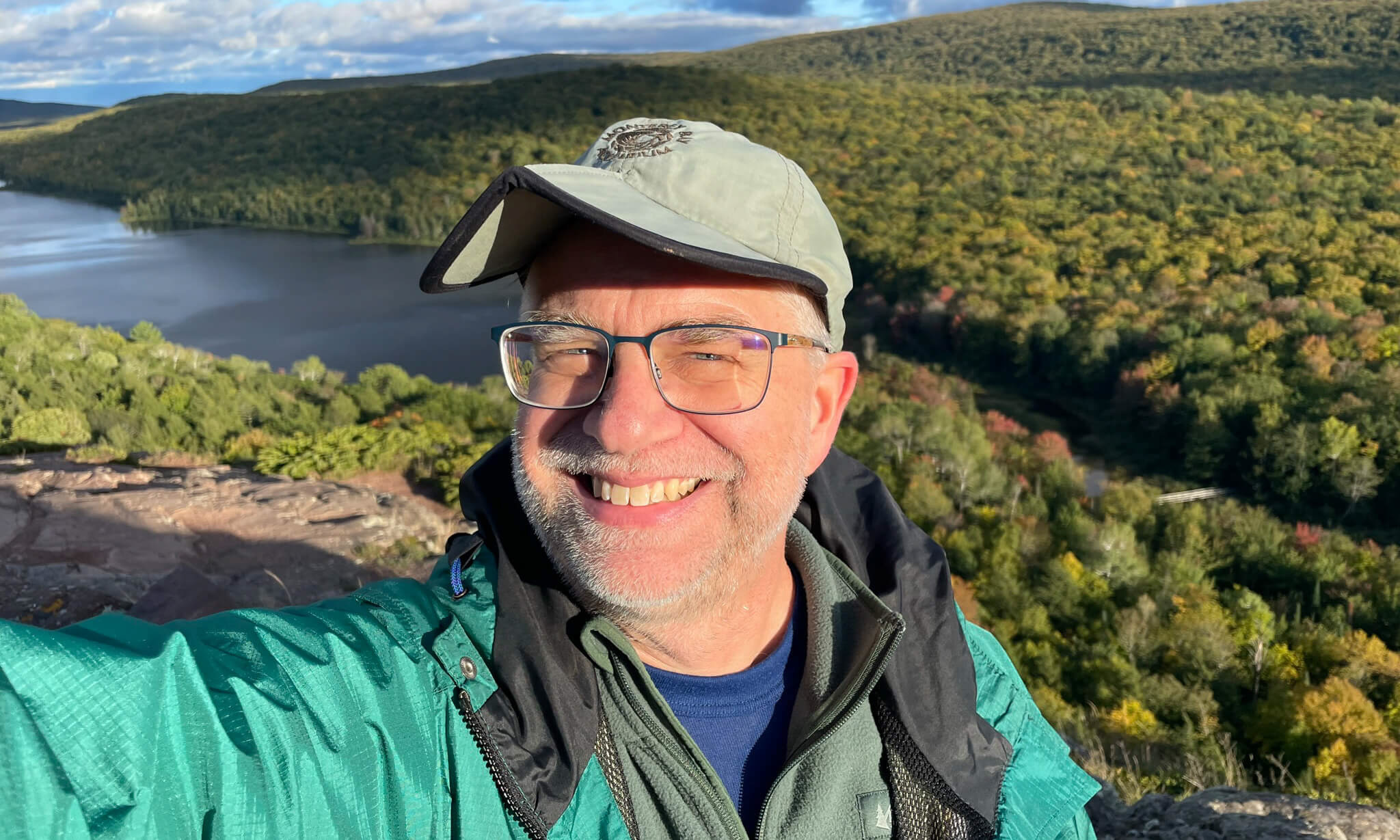
Meet CUW’s most tenured occupational therapy faculty member, Michael Borst, OTD.
The Occupational Therapy team at Concordia is made up of faculty with a variety of personal and professional backgrounds. Among them is Michael Borst, OTD.
Dr. Borst is CUW’s longest standing faculty member, having joined the CUW OT department in 2007. He has a rank of full professor, and is the team’s go-to person for technology troubleshooting.
What is your educational and career background?
I earned a B.A. in Psychology at Calvin University in Grand Rapids, Michigan. After a couple post-college gap years, I was ready to start graduate school, and I attended Western Michigan University, where I earned a M.S. in Occupational Therapy. At WMU, I was mentored by the legendary Dr. David L. Nelson, who taught me the essence of occupation and got me involved in research. After I started teaching, I earned a post-professional Doctor of Occupational Therapy degree with a focus on hand therapy from Rocky Mountain University of Health Professions.
I worked clinically at UW Hospital and at Meriter Hospital in Madison, WI. I have had lots of experiences in inpatient acute care, inpatient rehabilitation, and outpatient hand therapy. While working at Meriter Hospital, I earned a certificate in NeuroDevelopmental Treatment (Bobath), and became a Certified Hand Therapist.
What is your educational and career background?
Between family life and work life, I am kept pretty busy. When I do get some time away, I like being outdoors – hiking and camping in the summer, and cross-country skiing in the winter. I also enjoy tinkering. There’s always something to fix on our 1999 Coleman pop-up camper!
What brought you to Concordia?
It was a surprising path. I presented an educational institute at a Wisconsin Occupational Therapy Association annual meeting in 2004, and Carrie Scheel (an Occupational Therapy faculty member at CUW) was assigned to my room to introduce me, make sure everything went well, etc. We chatted for a bit, and went our separate ways. Three years later, Carrie called me out of the blue and asked me if I would be interested in a faculty position at CUW! A week later I interviewed, and two weeks after that, I was hired.
What is your area of expertise within Occupational Therapy? Share a little bit about the ways you share this with students/community.
I’ve worked with adults with physical limitations or injuries in a variety of settings, and my most focused experience is as a hand therapist. Hand therapists work with people who have had arm injuries or diseases and address their rehabilitation needs. I get to share this with students through the classes that I teach: “Occupational Kinesiology” and “Orthopedic Rehabilitation.”
What’s an interesting part of your field that people might not know?
The profession of Occupational Therapy originated in mental health practice in the 1910s. At the time, people with mental health problems were removed from society and thus lost access to many of their usual interactions with the world around them. The founders of Occupational Therapy saw that this occupational deprivation made people worse, not better, and started providing people with purposeful occupations in order to improve their health.
These origins explain why the focus of Occupational Therapy is on occupation, rather than medical interventions (though we do that too!). The early Occupational Therapists saw that people had to engage the body, mind, and spirit in the process of healing – mirroring Concordia University’s mission of helping students develop in mind, body, and spirit for service to Christ in the Church and in the world.
What does your research line involve?
My research line is eclectic, which is a fancy way of saying I cannot stick to just one thing! I have published research on the integration of faith and learning in higher education, and have written textbook chapters on evidence-based practice, orthopedic intervention, and physical agents (like heat, cold, and ultrasound). Currently I am co-writing a textbook on applied kinesiology for occupational therapists.
What do you love about the CUW OT program?
I love that I get to share both my Christian faith and the profession that I love with students. That is a pretty unique opportunity in the field of occupational therapy! I also love the diversity of our students. Every semester I teach undergrad students, post-baccalaureate students, and occupational therapy assistants who are currently practicing. Our students come from a variety of backgrounds, and I think that strengthens our program.
What is your advice to potential OT students?
You don’t need to know exactly which part of occupational therapy you want to practice in yet. The beauty of occupational therapy is that you can work with any age range, in any setting, addressing pretty much any need. Occupational therapy is about occupation (i.e. the things that people do every day that give them a sense of purpose). Occupation is like vocation; it is not only about work, but rather all the activities that God gives us to do.
Want in?
Wherever you’re at in your journey into occupational therapy, Concordia University has options for you at both the undergraduate, master’s, doctoral levels.
As a Christ-centered university, our program will help you advance in your calling, by learning from experienced therapists in a hands-on environment and developing a foundation in ethical leadership.
We offer the following programs in Occupational Therapy:
- Master of Occupational Therapy
- Accelerated track (for incoming freshmen)
- Bridge track
- Post-Baccalaureate track
- Entry Level Doctorate of Occupational Therapy (OTDe)
- OTA to OT Bridge Program
- Bachelor’s in Rehabilitation Science (BSRS)